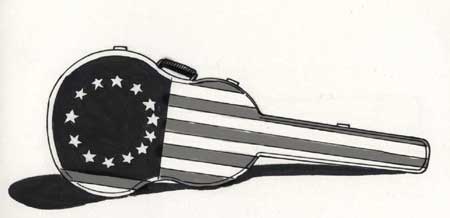
|
page 1 of 8
|
|
|
This was the jahiliyah -- the land of ignorance. This was America. The Great Satan, the Arsenal of Imperialism, the Bankroller of Zionism, the Bastion of Neo-Colonialism. The home of Hollywood and blonde sluts in black nylon. The land of rocket-equipped F-15s that slashed across God's sky, in godless pride. The land of nuclear-powered global navies, with cannon that fired shells as large as cars. They have forgotten that they used to shoot us, shell us, insult us, and equip our enemies. They have no memory, the Americans, and no history. Wind sweeps through them, and the past vanishes. They are like dead leaves. I flew into Miami, on a winter afternoon. The jet banked over a tangle of empty highways, then a large dead section of the city -- a ghetto perhaps. In our final approach we passed a coal-burning power plant, reflected in the canal. For a moment I mistook it for a mosque, its tall smokestacks slender as minarets. A Mosque for the American Dynamo. I had trouble with my cameras at customs. The customs officer was a grimy-looking American, white with hair the color of clay. He squinted at my passport. "That's an awful lot of film, Mr. Cuttab," he said. "Qutb," I said, smiling. "Sayyid Qutb. Call me Charlie." "Journalist, huh?" He looked unhappy. It seemed that I owed substantial import duties on my Japanese cameras, as well as my numerous rolls of Pakistani color film. He invited me into a small back office to discuss it. Money changed hands. I departed with my papers in order. The airport was half-full: mostly prosperous Venezuelans and Cubans, with the haunted look of men pursuing sin. I caught a taxi outside, a tiny vehicle like a motorcycle wrapped in glass. The cabby, an ancient black man, stowed my luggage in the cab's trailer. Within the cab's cramped confines, we were soon unwilling intimates. The cabbie's breath smelled of sweetened alcohol. "You Iranian?" the cabbie asked. "Arab." "We respect Iranians around here, we really do," the cabbie insisted. "So do we," I said. "We fought them on the Iraqi front for years." "Yeah?" said the cabbie uncertainly. "Seems to me I heard about that. How'd that end up?" "The Shi'ite holy cities were ceded to Iran. The Ba'athist regime is dead, and Iraq is now part of the Arab Caliphate." My words made no impression on him, and I had known it before I spoke. This is the land of ignorance. They know nothing about us, the Americans. After all this, and they still know nothing whatsoever. "Well, who's got more money these days?" the cabbie asked. "Y'all, or the Iranians?" "The Iranians have heavy industry," I said. "But we Arabs tip better." The cabbie smiled. It is very easy to buy Americans. The mention of money brightens them like a shot of drugs. It is not just the poverty; they were always like this, even when they were rich. It is the effect of spiritual emptiness. A terrible grinding emptiness in the very guts of the West, which no amount of Coca-Cola seems able to fill. We rolled down gloomy streets toward the hotel. Miami's streetlights were subsidized by commercial enterprises. It was another way of, as they say, shrugging the burden of essential services from the exhausted backs of the taxpayers. And onto the far sturdier shoulders of peddlers of aspirin, sticky sweetened drinks, and cosmetics. Their billboards gleamed bluely under harsh lights encased in bulletproof glass. It reminded me so strongly of Soviet agitprop that I had a sudden jarring sense of displacement, as if I were being sold Lenin and Engels and Marx in the handy jumbo size. The cabbie, wondering perhaps about his tip, offered to exchange dollars for riyals at black-market rates. I declined politely, having already done this in Cairo. The lining of my coat was stuffed with crisp Reagan $1,000 bills. I also had several hundred in pocket change, and an extensive credit line at the Islamic Bank of Jerusalem. I foresaw no difficulties. Outside the hotel, I gave the ancient driver a pair of fifties. Another very old man, of Hispanic descent, took my bags on a trolley. I registered under the gaze of a very old woman. Like all American women, she was dressed in a way intended to provoke lust. In the young, this technique works admirably, as proved by America's unhappy history of sexually transmitted plague. In the very old, it provokes only sad disgust. I smiled on the horrible old woman and paid in advance. I was rewarded by a double-handful of glossy brochures promoting local casinos, strip-joints, and bars. The room was adequate. This had once been a fine hotel. The air-conditioning was quiet and both hot and cold water worked well. A wide flat screen covering most of one wall offered dozens of channels of television. My wristwatch buzzed quietly, its programmed dial indicating the direction of Mecca. I took the rug from my luggage and spread it before the window. I cleansed my face, my hands, my feet. Then I knelt before the darkening chaos of Miami, many stories below. I assumed the eight positions, bowing carefully, sinking with gratitude into deep meditation. I forced away the stress of jet-lag, the innate tension and fear of a Believer among enemies. Prayer completed, I changed my clothing, putting aside my dark Western business suit. I assumed denim jeans, a long-sleeved shirt, and photographer's vest. I slipped my press card, my passport, my health cards into the vest's zippered pockets, and draped the cameras around myself. I then returned to the lobby downstairs, to await the arrival of the American rock star. |
|
